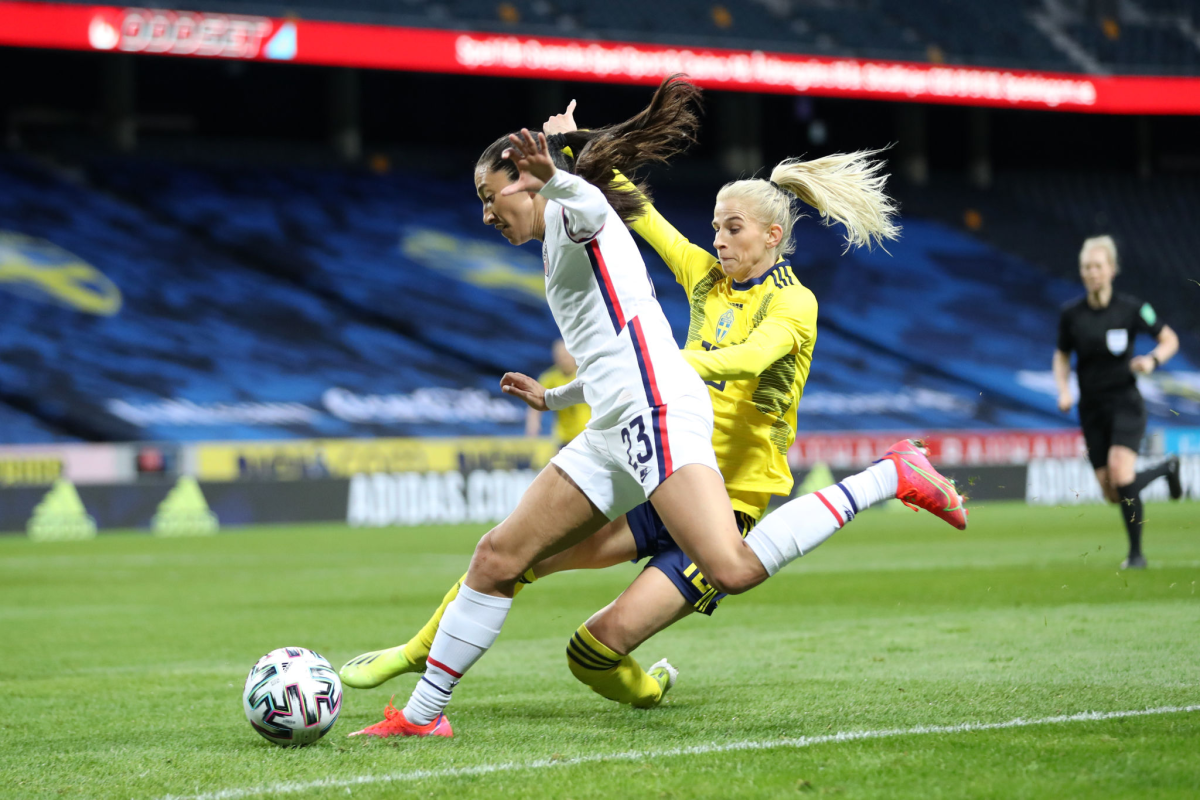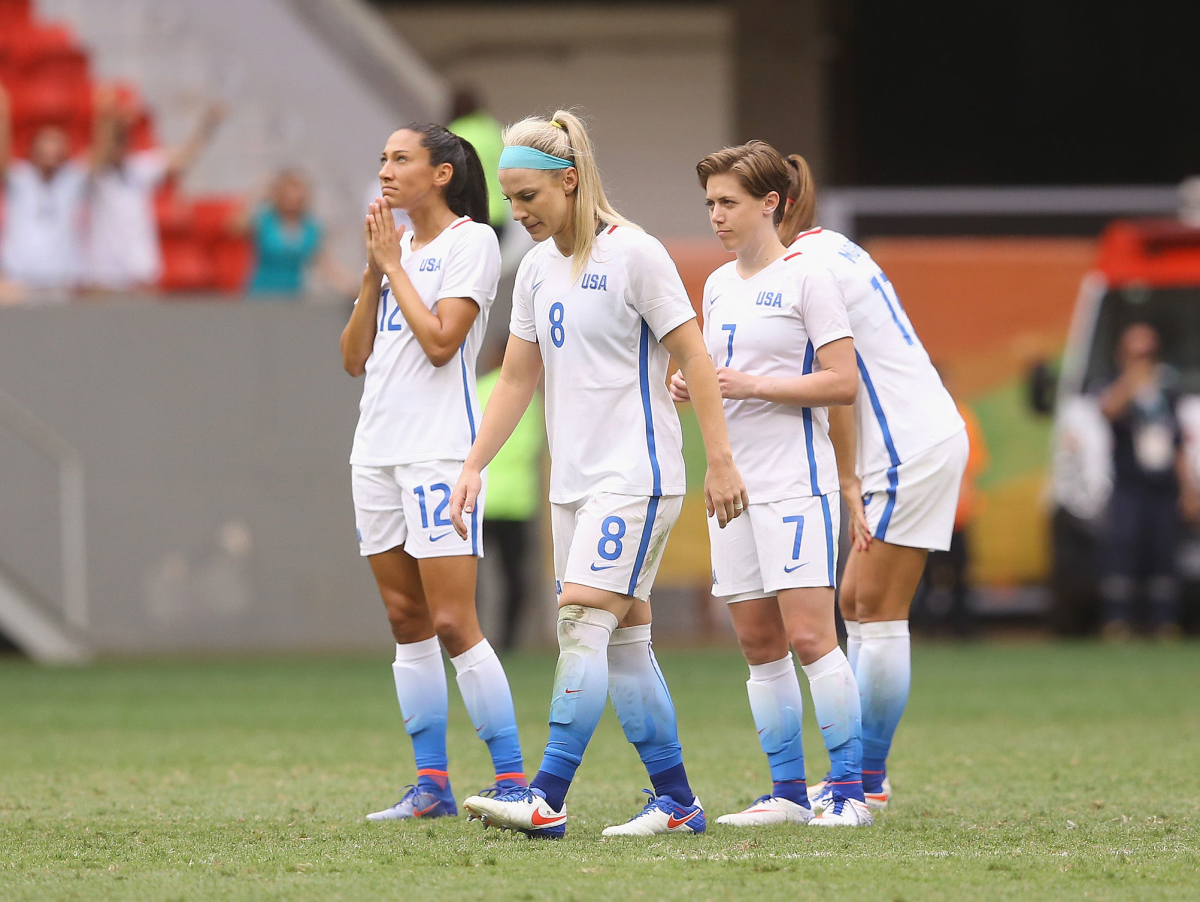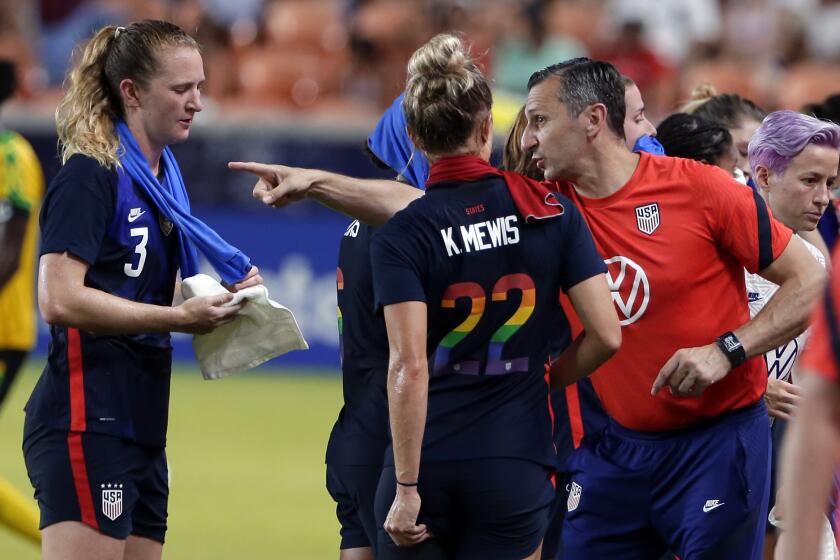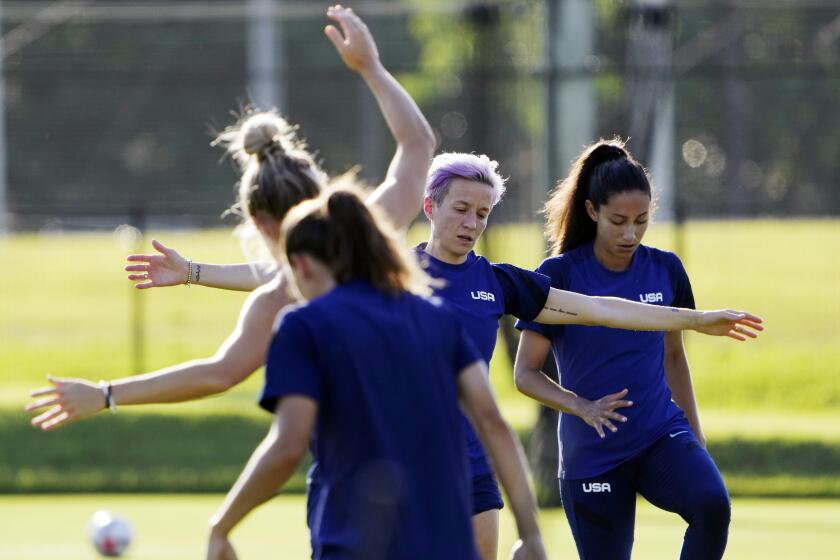Christen Press: USWNT loss to Sweden in Rio drives its quest for Olympic gold

TOKYO — Christen Press spat the words out with tired acknowledgement more than excitement.
“In world championships,” she said, “we always play Sweden at some point.”
The Tokyo Olympics are no exception. The women’s national soccer team faced Sweden in six of the eight Women’s World Cups and twice in six Olympic tournaments, the last coming five years ago in Brazil when Sweden eliminated the U.S. on penalty kicks.
That quarterfinal loss in Brazil marked the only time the U.S. has failed to reach the final of an Olympic tournament and the Americans don’t have to wait long for a chance at revenge, opening group play of the pandemic-delayed Japan tournament Wednesday against Sweden at Tokyo Stadium.
The U.S. women’s soccer team’s No. 1 world ranking means anything less than gold in the Tokyo Olympics is failure for new coach Vlatko Andonovski.
“There’s absolutely a bitter taste in all of the players that were part of that match and how it ended,” she said. “That’s what drives this time. One of the first things that I learned about this team is how to flip any pressure and expectation and history. And it was probably the most valuable lesson.”
It’s also one Press learned well because no U.S. player was left with a more bitter taste from the loss in Brazil than Press, who skied her penalty kick well over the goal to seal the Americans’ fate. But no player has done a better job of turning that bitter taste sweet than Press, who has gone from being a bench player in the last Olympics to the driver of the most dominant women’s team in soccer history.
The headlines may to go to teammates Megan Rapinoe, Alex Morgan and Carli Lloyd but the offense goes through Press, who has been directly involved in 37 goals in her last 37 games. Over the last two years no one has scored more goals than Press for a U.S. team that last lost 45 games and 2½ years ago.
And the journey to that level of domination for both Press and her team started in despair with that heartbreaking loss in Brasilia five summers ago.

The Swedes were coached by Pia Sundhage, who had taken the U.S. to its third straight gold medal four years earlier. She knew her new team couldn’t go toe-to-toe with her old one, so she bunkered in from the opening kickoff, hoping to win the game in penalty kicks — and that was exactly what happened.
An hour after the game Morgan, who had never lost a game in an Olympic tournament, was in tears. Goalkeeper Hope Solo was angry.
“We played a bunch of cowards,” she said, a comment that earned her a suspension from U.S. Soccer. She never played another game for the national team.
Press was between tears and anger, her career at a crossroads. Her slow, head-down walk over the field in Brasilia was painful to watch. But when it was over she took the high road, never making excuses and quietly getting back to work, scoring seven of her career-high 12 goals in her final six games of 2016, becoming the fifth women in national team history to score in double figures three years in a row.
“My ambition is quite simply to put one foot in front of the other each day and to be a better player and a better person with each experience.”
— Christen Press
Three years later, she was one of just three U.S. players to appear in all seven wins in the Women’s World Cup in France, scoring the opening goal in a 2-1 win over England in the semifinals.
“As a human I want, each year, to evolve,” she said. “My ambition is quite simply to put one foot in front of the other each day and to be a better player and a better person with each experience.”
“Do I feel happier, healthier, more confident, more capable? Absolutely,” added Press, who won two CIF titles at the Chadwick School in Palos Verdes before going to Stanford, where she won the Hermann Trophy as the nation’s top player and the Pac-10’s Scholar Athlete of the Year award. “As a younger player I was singularly focused on scoring. I think my greatest development has been adding other aspects of the game to my arsenal.”
That has included tracking back on defense, facilitating goals and looking for the pass first and the shot second. Her journey also took her back to Europe, first to Sweden’s Kopparbergs/Goteborg, where she had played earlier, and then to Manchester United of the Women’s Super League.
Learn more about the 22 U.S. women’s national team players who traveled to Japan for the Tokyo Olympics.
“It was kind of a year-long lesson on defending,” Press said of her time in England under coach Casey Stoney. “I really just studied and learned and improved my defensive positioning and the nuances of defending.”
The U.S., ranked No. 1 the world by FIFA for 49 consecutive months, came to Tokyo chasing history because after winning their fourth Women’s World Cup two years ago, a sixth Olympic gold medal would make it the first team of either gender to win World Cup and Olympic titles in the same cycle.
Wednesday’s opener with No. 5 Sweden figures to be the Americans’ toughest test in a group stage that will conclude with games against New Zealand and No. 9 Australia.
“Yeah, that’s true,” said Vlatko Andonovski, who is unbeaten in 23 games as U.S. coach, with only an April draw with Sweden — earned on a Rapinoe penalty kick in the 87th minute — marring his record. “And we’re going to do everything possible to get ready. But if you look at it from Sweden’s perspective, they can say the same thing right?”
The game will determine the route both the U.S. and Sweden take the rest of the way against the best field in Olympic history, a 12-team group that includes eight of the world’s top 10 teams and the four semifinalists from the 2019 Women’s World Cup.
But if the tournament is the deepest ever, so is the U.S. roster, whose 22 players include 17 from the unbeaten 2019 Women’s World Cup team and 11 of the 18 players from the Rio Olympics. The team averages 92 international caps and has 77 combined games of Olympic experience.
“We are more experienced. We’ve been down this road before,” said Carli Lloyd, the only player in history to score the winning goal in two Olympic finals.
Press, at 32, one of 11 players older than 30, is part of that experienced core, with two World Cup titles and two Olympics – she was alternate in 2012 – on her resume. And she heads into the Tokyo tournament looking both forward and back.
The loss in Brazil is in the rear-view mirror now, a big bump in an otherwise smooth ride that seen Press become one of eight U.S. players to top both 100 caps and 60 goals. But that result, as well as Press’s other achievements, are part of her legacy and the legacy of the team. And she’s determined to make sure it’s one everybody continues to learn from.
“I love being a veteran on this team. I love being a culture carrier,” she said. “Ultimately wherever the road leads, life just has so much to offer.
“The beautiful thing about football is you cannot perfect it. It forces you to strive for greatness and greatness is never reached. There’s always more to do.”
More to Read
Go beyond the scoreboard
Get the latest on L.A.'s teams in the daily Sports Report newsletter.
You may occasionally receive promotional content from the Los Angeles Times.










